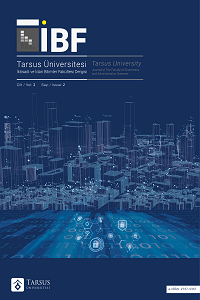Abstract
Bir kişi dahi olsa bile, her şeyi bilmesi imkansızdır. Çünkü tüm insanlarda rasyonel umursamazlık bir dereceye kadar kaçınılmazdır ve neyi bilmeye ve anlamaya değer olduğuna şahsen karar vermeliyiz. Rasyonel umursamazlık, hangi bilgilerin en yararlı olacağına karar vermemize yardımcı olur. Rasyonel umursamazlık, bir konuda bilinçsiz olarak kalmayı seçmek anlamına gelir; çünkü bilgi edinmenin maliyeti tahmin edilen potansiyel faydalardan daha yüksek olabilir. Seçime dayalı demokratik sistemlerde yönetimler seçimle başa gelirler. Adaylar seçimleri kazanabilmek için seçmenlerden aldığı oylarını en yüksek orana getirmeye çalışırlar. Ancak seçim kampanyalarında kendilerini ve politikalarını en iyi şekilde ifade edebilmek ve kampanya harcamalarını karşılayabilmek için çıkar gruplarının maddi desteğine veya danışmanlık hizmetine ihtiyaç duyarlar. Bu iki farklı kesimin çıkarlarının çatışması durumunda kamuyu yönetmeye talip olan adaylar arada bir denge kurmaya ve seçildikten sonra da rasyonel anlamda olayları göz ardı eden seçmenin rasyonel umursamazlığından yararlanarak çıkar gruplarına fayda temin etmeye çalışırlar. Bu çalışmada rasyonel umursamazlığın seçmenler, çıkar grupları ve kamu düzenleyicilerinin birbirleriyle ilişkileri üzerinde olası etkilerinin ne olabileceği konusundan bahsedilecektir.
Keywords
Rasyonel umursamazlık Seçmenlerin rasyonel umursamazlığı Çıkar Grupları Kamu Düzenleyicileri
References
- Congleton, Roger (2016), Public Choice 1 Notes, web address: http://rdc1.net/class/PublicChoice%20%28grad%29/index.html (available, Apr. 30, 2021).
- Denzau, Arthur T. and Murger, Micheal C., (1986), “Legislatures and Unorganized Interest Gets Represented”, American Political Science Review, Vol: 80, No:1, pp: 89-106.
- Downs, Anthony, (1957), An Economic Theory of Democracy, by Harper, NY, USA.
- Downs, Anthony, (1960), “Why Government Budget is Too Small In a Democracy”, World Politics, Vol: 12, No: 4. Pp: 541-563.
- Galles, G.M. and Sexton, R.L, (1995), “Rational Ignorance, Deceptive Advertising and the Size of Government”, The Journal of Social, Political and Economic Studies, Vol: 20, No: 4., pp: 423-434.
- Heyndels, B. and Smolders, C. (1994), “Fiscal illusion at the local level: Empirical evidence for the Flemish municipalities”, Public Choice 80, Kluwer Academic Publishers. Printed in the Netherlands. Pp:325-338.
- Jones, P. and Hudson, J., (2005) “Rationality and Voting”, The Journal of Economic Perspectives, Vol. 19, No. 1 (Winter, 2005), pp. 242-243.
- Kaplan, B. (2001), “Rational Ignorance versus Rational Irrationality”, KYKLOS, Vol: 54, Fasc.1, pp: 3-26.
- McGuire, Dennis W., (1989), Alternative Factual Assumptions in Public Choice Theory: a Test of Their Validity, PhD Dissertation, Simon Fraser University, Canada.
- Mueller, Dennis C. (1996), Public Choice II, by Cambridge University Press, USA.
- Patterson, Thomas E., (1996), The American Democracy, by McGraw Hill, Third ed., USA.
- Peltzman, S. (1976), “Toward a More General Theory of Regulation”, Journal of Law and Economics, Vol. 19, no. 2, pp: 211-240.
- Somin, I. (2013), “Why (most) Political Ignorance is Rational and Why it Matters: Reply to Jeffrey Friedman”, https://www.cato-unbound.org/2013/10/22/ilya-somin/why-most-political-ignorance-rational-why-it-matters-reply-jeffrey-friedman (available May, 28, 2021).
Abstract
It is impossible to know everything for anybody even if he/she is a genius person. For the all human being rational ignorance is inevitable to some degree and we all must personally decide what is worth knowing and understanding. Rational ignorance helps each of us decide what information would be most useful. Rational ignorance means intentionally choosing to remain uninformed on a topic because the cost of acquiring the information is greater than the estimated potential benefits. In elective democratic systems, Government comes to power with an election. In order to obtain the power, Regulators/candidates try to maximize the number of votes they receive in elections and money and/or special knowledge of special interest groups to cover his campaign expenses to give messages to inform voters about their policies. In case of any conflict between voters and special interest groups’ outcome, regulators can take advantage of rational ignored voters to give some benefits to the special interest group. In this paper, it will be tried to explain the reasons behind voters’ rational ignorance, how voters’ utility change in cases of perfect information and imperfect information and how special interest groups can take advantage from voters’ rational ignorance situation and how candidates or regulators will behave to maximize their expected votes.
References
- Congleton, Roger (2016), Public Choice 1 Notes, web address: http://rdc1.net/class/PublicChoice%20%28grad%29/index.html (available, Apr. 30, 2021).
- Denzau, Arthur T. and Murger, Micheal C., (1986), “Legislatures and Unorganized Interest Gets Represented”, American Political Science Review, Vol: 80, No:1, pp: 89-106.
- Downs, Anthony, (1957), An Economic Theory of Democracy, by Harper, NY, USA.
- Downs, Anthony, (1960), “Why Government Budget is Too Small In a Democracy”, World Politics, Vol: 12, No: 4. Pp: 541-563.
- Galles, G.M. and Sexton, R.L, (1995), “Rational Ignorance, Deceptive Advertising and the Size of Government”, The Journal of Social, Political and Economic Studies, Vol: 20, No: 4., pp: 423-434.
- Heyndels, B. and Smolders, C. (1994), “Fiscal illusion at the local level: Empirical evidence for the Flemish municipalities”, Public Choice 80, Kluwer Academic Publishers. Printed in the Netherlands. Pp:325-338.
- Jones, P. and Hudson, J., (2005) “Rationality and Voting”, The Journal of Economic Perspectives, Vol. 19, No. 1 (Winter, 2005), pp. 242-243.
- Kaplan, B. (2001), “Rational Ignorance versus Rational Irrationality”, KYKLOS, Vol: 54, Fasc.1, pp: 3-26.
- McGuire, Dennis W., (1989), Alternative Factual Assumptions in Public Choice Theory: a Test of Their Validity, PhD Dissertation, Simon Fraser University, Canada.
- Mueller, Dennis C. (1996), Public Choice II, by Cambridge University Press, USA.
- Patterson, Thomas E., (1996), The American Democracy, by McGraw Hill, Third ed., USA.
- Peltzman, S. (1976), “Toward a More General Theory of Regulation”, Journal of Law and Economics, Vol. 19, no. 2, pp: 211-240.
- Somin, I. (2013), “Why (most) Political Ignorance is Rational and Why it Matters: Reply to Jeffrey Friedman”, https://www.cato-unbound.org/2013/10/22/ilya-somin/why-most-political-ignorance-rational-why-it-matters-reply-jeffrey-friedman (available May, 28, 2021).
Details
| Primary Language | English |
|---|---|
| Subjects | Economics |
| Journal Section | Research Articles |
| Authors | |
| Publication Date | December 6, 2021 |
| Submission Date | June 28, 2021 |
| Published in Issue | Year 2021 Volume: 2 Issue: 2 |


